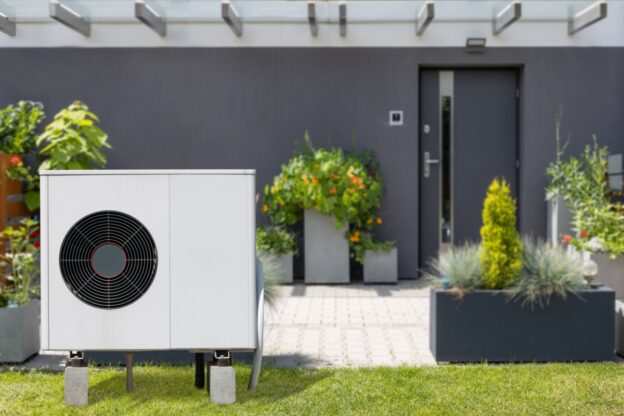Shopping for a new AC system presents a range of choices and decisions that can feel overwhelming. Whether to opt for a central air conditioner or explore the benefits of heat pumps is a question many homeowners face. Each system offers distinct advantages and potential drawbacks, and understanding these can greatly influence comfort and cost-effectiveness. You want to make the best choice for your needs upfront because an AC unit isn’t quite as easy to return as that sweater you bought on Amazon.
Care Temp has established itself as a leader in heating and cooling solutions in Ocean County, NJ, and surrounding areas. With a commitment to excellence and customer satisfaction, we’re here to guide you through the decision-making and installation process. Continue reading to gain a clearer insight into which system might be best for your home.
Central Air Conditioning: Advantages and Disadvantages
Advantages
Central air conditioners are renowned for their ability to cool large spaces efficiently and uniformly. This type of system uses a network of ducts to distribute chilled air, making sure each room reaches the desired temperature. The modern central air conditioning units are also equipped with advanced filtration systems that enhance indoor air quality by removing allergens and pollutants from the air.
Disadvantages
Installing a central air conditioning system can be intrusive, requiring significant space for ducts and equipment. This might not be ideal for older homes where duct installation would require extensive renovation. Furthermore, central air conditioners can consume more electricity than other systems, potentially leading to higher energy bills, especially if the system isn’t regularly maintained or if the ductwork leaks.
Heat Pumps: Advantages and Disadvantages
Advantages
Heat pumps are increasingly popular due to their exceptional efficiency and versatility. Heat pumps come in various types, including air-source, which draws heat from the air; ground-source, which harnesses heat from the ground; and water-source, which extracts heat from water bodies. These systems operate by moving heat rather than generating it, which means they can provide both cooling and heating, making them ideal for use year-round.
Heat pumps are known for their energy efficiency, often resulting in lower electricity usage reflected in reduced energy bills. Their operation is generally quieter than traditional heating systems like furnaces and boilers, adding to their appeal in residential settings.
Disadvantages
While heat pumps offer heating and cooling capabilities, their efficiency can drop in extremely cold climates, necessitating a supplementary heat source when temperatures fall too low. The initial cost for a heat pump system, particularly high-efficiency models like those rated by Energy Star, can be higher than traditional air conditioning units. However, the investment can pay off in long-term savings and reduced energy consumption.
Maintenance: Central AC Systems vs. Heat Pumps
When it comes to maintenance, both central AC systems and heat pumps require regular upkeep to ensure optimal performance. Central AC systems and heat pumps can involve complex ductwork, which can accumulate dust and debris and necessitate professional cleaning to maintain air quality and system efficiency. Maintenance for both also focuses on the outdoor unit and filters. However, since heat pumps are used year-round for both heating and cooling, they may experience wear more quickly and could require more frequent checks, depending on the climate and usage patterns.
Installation: Considering Climate and Budget
The installation process for central AC systems and heat pumps varies significantly and is heavily influenced by the existing home infrastructure and climate. AC installation typically requires extensive ductwork, which can be costly and intrusive, particularly in homes not originally built with air conditioning in mind.
Heat pumps, especially air-source models, often require less invasive installation and can be more budget-friendly upfront. Ductless mini-split heat pumps offer a versatile and efficient heating and cooling solution without the need for extensive ductwork, making them ideal for homes or rooms where traditional ducted systems are impractical.
However, the suitability of a heat pump largely depends on the climate; they are most efficient in moderate temperatures and might not be the best primary heating source in regions with extreme winters unless paired with a secondary heat source.
Energy Efficiency: SEER Ratings and Long-Term Savings
Energy efficiency is a critical factor in choosing between a central AC system and a heat pump. Heat pumps are generally more energy-efficient than traditional central air conditioners, primarily because they utilize the external environment for heating and cooling, reducing the overall electricity usage.
This efficiency is often reflected in a higher Seasonal Energy Efficiency Ratio (SEER), which measures air conditioning and heat pump cooling efficiency. A higher SEER rating typically indicates a more energy-efficient unit, potentially offering significant long-term savings on energy bills.
Central AC systems, while improved in efficiency over the years, usually consume more energy compared to heat pumps, especially in areas where the climate demands both heating and cooling across the seasons.
Why Choose Care Temp?
The choice between a heat pump and a central air system is significant and depends on various factors unique to each homeowner. Our team of skilled technicians and HVAC installers is equipped to provide tailored advice and top-notch installation services. We pride ourselves on helping our customers navigate these choices, ensuring you receive the best possible service and outcomes.
Contact Us for AC Installation Advice in Ocean and Monmouth County
If you’re considering a new air conditioning system or need more information on the best options available, don’t hesitate to contact Care Temp. We offer comprehensive AC installation services and expert advice in Ocean County and Monmouth County, NJ. Let us help you achieve the perfect balance of comfort, efficiency, and cost-saving in your home. Call us today to discuss your cooling and heating needs and find out how we can bring you the comfort you deserve.




